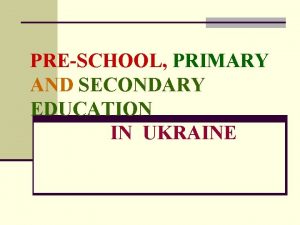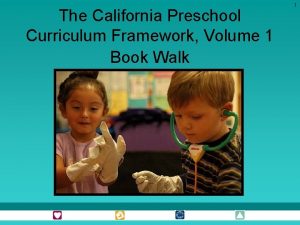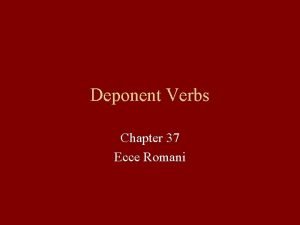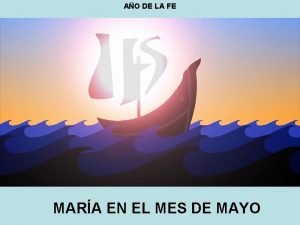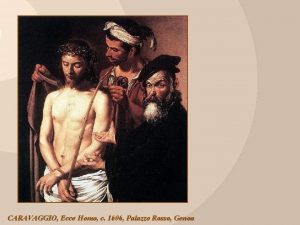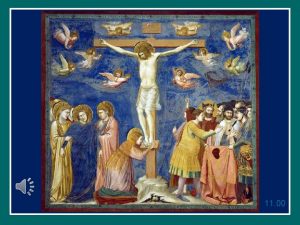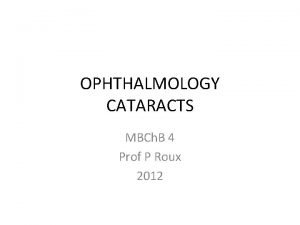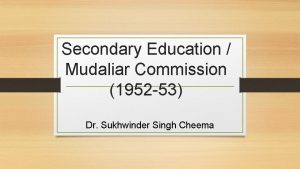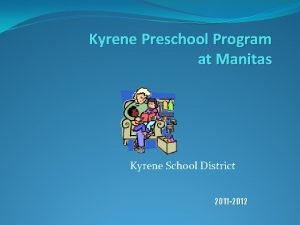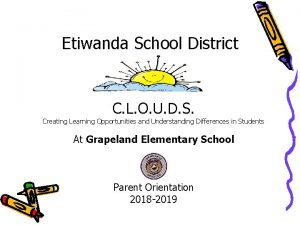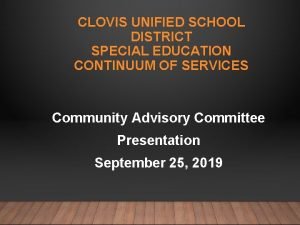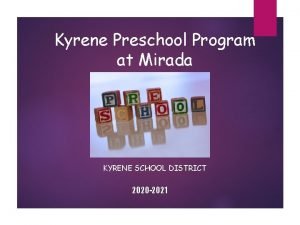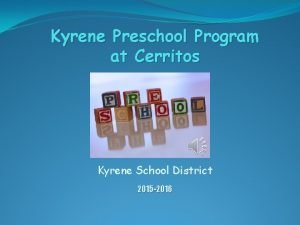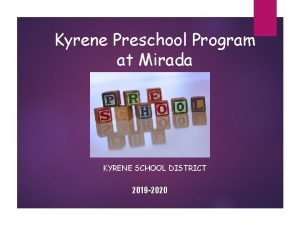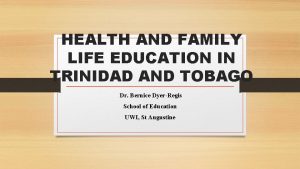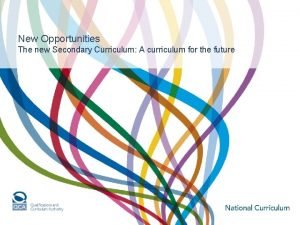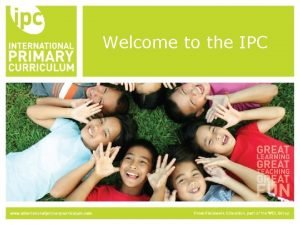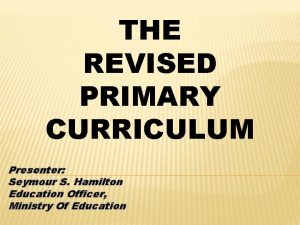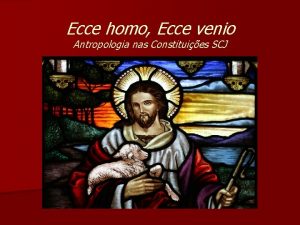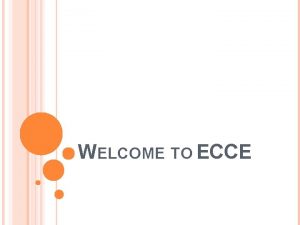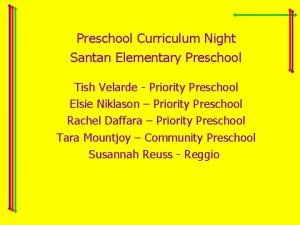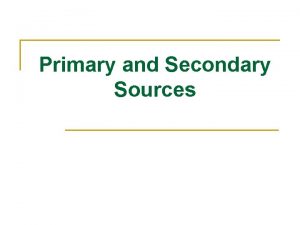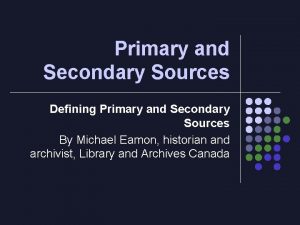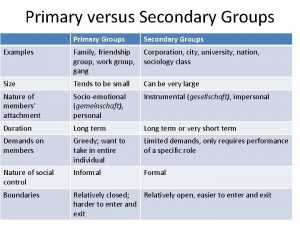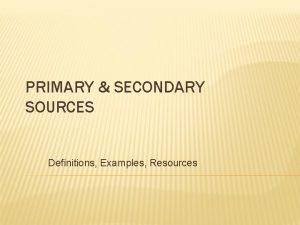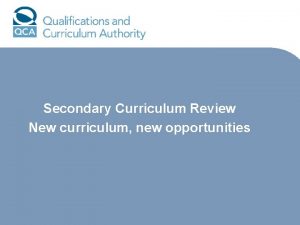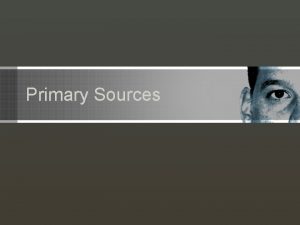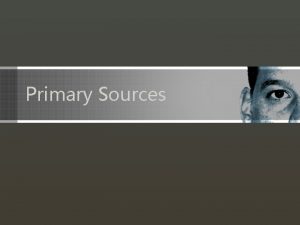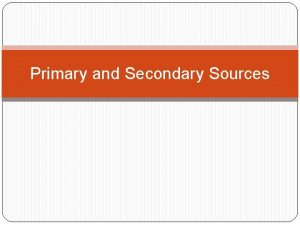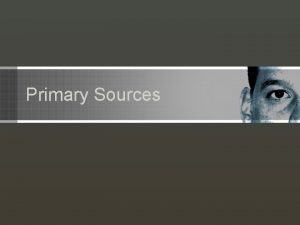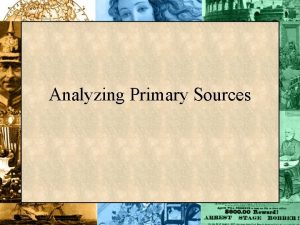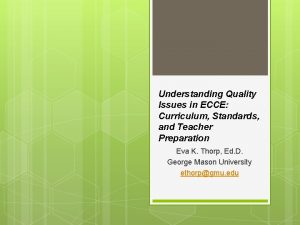School Curriculum PreSchool ECCE Primary School Secondary School

















- Slides: 17

School Curriculum Pre-School ECCE Primary School Secondary School Reference Unit 15 Progressive College Notes

Pre -school • EPSEN 2004 – special needs education and inclusion. • Since 2016 Schools are LEGALLY obliged to provide – inclusive education of those with intellectuall disabilities, emotional and behavioural difficulties, physical and sensory disabilities, specific learning disabilities, specifis speech and language disorders and autism ONCE it is in THE BEST INTEREST OF THE CHILD. • Disability Act 2005 provides assessment for children under 5 with officers based at local HSE centres, accessing professional within the MDT. • Formal education must commence by 6 years – LAW • ECCE – 2 free preschool years ( 2 yr 8 mths – 5 yr 6 mths) • Preschool children learn via integration, socialisation, imitation and interaction with their peers. Keys skills introduced include maths/ logic; recognising shape, colour, pattern… Language skills including listening and following instruction. • Early Intervention – home base learning system by trained professionals.

Pre – school and Special needs • Within the ECCE scheme – Visiting teacher service for children with visual and hearing impairments – Early intervention services aim to provide treatment on diagnosis. • Options available include; mainstream pre-school, special preschool ( Enable Ireland) full or part-time, privately pre-school. Parents need SUPPORT to clarify confusion, anxiety and isolationthis is key to developing a partnership. • AIM – The Access and Inclusion Model - support ECCE programme, meet individual needs and may offer INCLUSION OFFICERS who will co-ordinate inclusion programme. • SPECIAL PRE-SCHOOL have access to a full MDT – huge Advantage!! Examples include; Daughters of Charity, Kare, Enable Ireland, St Michaels House, Stewarts Care…. . • The HSE is RESPONSIBLE for a child with special needs from BIRTH.

Pre – School Curriculum • Aistear – Well being, Communications, Identity and Belonging, Exploring and Thinking. www. curriculumonline. ie • Learning through PLAY in a supportive, structured supervised environment. Key areas include Language, literacy, numeracy, Books, story telling, practical life skills, sensory and physical education as adopted from Montessori method. • Class teacher may identify learning problems through, observations and checklists. These can be discussed with the Public health nurse during regular check ups. Referrals made to MDT including psychologist and social worker.

Primary School • EPSEN 2004 “A child with special needs shall be educated in an inclusive environment with children who do not have such needs unless this integration is not in the best interest of the child” • Education Options: Mainstream, Special class or Special Unit within Mainstream, Special Schools, Reading Schools ( 2 nd class to 12 years), Autism Units, ABA Schools, Home School Tuition programme, July Provision. • Primary schools get a “general allocation” in order to meet the needs of children with specific learning disabilities, borderline and mild/general learning disabilities. These include speech and language difficulties, mild social and emotional difficulties, mild coordination or attention difficulties associated with conditions such a dyspraxia and ADHD. Each school decides how to use these resources and additional supports may be allocated by the SENO once an individual application has been accepted.

Primary School Curriculum • Primary school curriculum introduced in 1999. Seeks to ENABLE a child to live a full life, to realise their POTENTIAL as an INDIVIDUAL. To develop as a SOCAIL BEING via co-operation and contribution to society and to prepare for LIFE LONG LEARNING. • Philosophy of education has 5 principles: child development, respect individual difference, activity through discovery, integration of nature, environment based learning. ( see unit 15 for detail) • Education Act 1998 - Key issues associated with primary education are: • Quality, Literacy and Numeracy, Irish Identity, Irish language, Spiritual dimension, European and global influences, Equality and fairness, partnership in education, ICT, special needs inclusion, Early childhood education, transition from school settings, Life long learning.

Primary Curriculum Areas Language – Gaeilge and English Mathematics SESE – History, Geography, Science Arts Education – Visual Arts, Music, Drama Physical Education SPHE Subjects cross over/integrate in a logical approach. The child is an ACTIVE AGENT in their own education. Developing a self-reliance and independence, with group work they can also learn values of co -operation and social development. • The teacher is to provide suitable learning situations, to guide and stimulate the child in pursuit of their own development. It is not a case of imposing knowledge but creating and environment of infectious enthusiasm. • •

SPHE • • • SPHE – Social, Personal and Health Education. A frame work of values, attitudes, understanding and skills developing a health pattern of behaviour. SPHE promotes self-esteem and self- confidence, it explores feelings abilities and behaviours. It supports positive relationships in a safe environment. Strands> 1. Myself 2. Myself and others 3. Myself and the Wider world (full detailed in unit 15 ) Myself – understanding oneself, self – identity, self –care, self – respect, risk awareness ( STAY SAFE PROGRAMME), self-protection, decision making, awareness of rights and responsibilities. Myself and Others - care for and respect others, appropriate interaction, communication, play and team work. Focus on Myself and My Family, friendship – formation and changing, listening, talking, discussing, empathy, conflict resolution ( BULLYING) Myself and the Wider World – respect for cultural and human diversity, the school as a community, local community, National, European and interdependence of Wider world, ownership, citizenship, linking in with SESE ( social, environmental and science education).

Mathematics • • Progression from concrete to abstract in 3 stages. 1. Concrete stage – actual materials to count, sort and group, e. g. Blocks, counters, cubes. 2. Passage to abstract stage – write the correct number beside the given amount. Introduce addition by counting the dots beside the numbers. 3. Abstract stage – use only numbers to solve problems. Supporting children with special needs requires DIRECT INSTRUCTION that is specific and straight forward, with opportunities to learn, practise and use skills. There is a 4 step sequence to follow (a) specific objective, (b) sub-skills required, © prior knowledge, (d) sequence the steps. Ref: Simmons and Kimeenin 1996/Carnine 1997/Elliot and shapiro 1990 CONSTRUCTIVE LEARNING idea is that a child must construct their own solution to a maths problem – build mental structures – requires a higher level of thinking and ability. Based on the Chinese proverb: I hear and I forget. I see and I remember. I do and I understand. Curriculum 5 stands: Numbers, Algebra, Shape and Space, Measures and Data

SESE • Social, Environmental and Scientific Education • Opportunities for the child to explore, investigate and develop an understanding of Natural, Human, Social, Cultural dimensions of local and wider world. Looking at History, Geography and Science. • Brings a sense of place and space, environmental awareness, understanding of time, sequence of events, change and continuity, cause and effect, interpretation of evidence, awakens curiosity. Learning should be productive and FUN. • Supports questioning: WHAT? WHEN? WHY? HOW? Encourages Exploring, Planning, Making and Evaluating

Circle Time • A democratic and creative approach where a range of issues can be discussed by the WHOLE SCHOOL COMMUNITY. • The aim is to motivate, the sharing of thoughts in a safe environment with collective responsibility to promote selfesteem and positive behaviour. It builds trust, listening and speaking skills, tolerance and patience. • Ideally it is once a week in the classroom for 20 -30 minutes, code of behaviour to be observed, all sessions should have a POSITIVE focus. • Must have a structured beginning , middle and end. A Talking object can be used.

Secondary/Post primary Curriculum • • • Junior Certificate Schools Programme Transition Year Programme Leaving Certificate Applied Programme LCA Leaving Certificate Vocational Programme LCVP

Junior Cycle • 2014 – Junior cycle redesigned to continue focus on English, Maths and Irish with emphasis on literacy and numeracy, providing a quality, inclusive and relevant education with improving learning outcomes for ALL students. • Plan to replace exams with school-based model of assessment. • Core subjects remain as Irish, English, Maths, History, Geography, Science, Business Studies, French, German, Home Economics…. . • Short courses of 100 hours over a 3 year period including CSPE, RE, SPHE, PE with the addition of Digital Media Literacy, Programming/Coding, Chinese and Artistic performance are to be implemented. • JCSP – designed to support those at risk of leaving school early available in all DEIS schools, special needs schools, children detention centres, traveller training centres and youth encounter projects.

Junior Cycle • Focus of the JCSP is literacy, numeracy, spoken language, artistic and scientific expression, guidance in personal health, sexual awareness and relationships, computer literacy, social and cultural heritage • All JCSP students study the junior cert syllabus and partake in the Junior cert exams, those who have been profiled are entitled to submit a record of their achievement this is in addition to the Junior cert. • “ Every student is capable of success. The goal of the programme is to ensure students enjoy positive experiences of school through creative, broad- based curriculum and go on to achieve in their Junior Certificate Examination “ • The courses followed will lead to foundation level English, Maths and Irish. The profiling system allows for continuous assessment. A style in which the government plans to implement going forward.

Transition Year Programme • TY – one year bridging programme, since 2000, the DES issued an official Transition Year Certificate in addition to school – based certification. • Aims of TY = Emphasis on personal development, social awareness, social competence, promotion of general, technical and academic skills with selfdirected learning. Education through experience of adult working life.

Senior Level • Leaving Certificate Applied – LCA • A 2 year programme designed for students who DO NOT WISH TO GO INTO HIGHER EDUCATION. • The course offers work experience, encouraging responsibility for individual success. It involves research, interviews, videos, photography. • It prepares the school leaver for transition from school to working life. It uses continuous assessment via project work, twice yearly on different areas of study. Grading is based on distinction or pass. • All students follow the same course. To achieve the student has learn more on their own. The motivation is NOT FEAR OF AUTHORITY but rather, a DESIRE to SUCCEED. • This method encourages students to stay in the education system and is very successful for those with special needs.

Leaving Certificate • Standard leaving certificate minimum of 5 subjects, average is 7, 34 subjects are available. Foundation, Ordinary, higher Level. Purely Exam focused currently. • LCVP – Leaving Certificate Vocational Programme – students take 6 or 7 standard leaving certificate subjects and 2 additional Link Modules: Preparation for the world of work and Enterprise Education.
 Ukraine preschool
Ukraine preschool Preschool curriculum framework
Preschool curriculum framework Ecce romani chapter 37
Ecce romani chapter 37 Quia respexit
Quia respexit Caravaggio genua
Caravaggio genua ...qui tollis peccata mundi
...qui tollis peccata mundi Ecce
Ecce Defects of secondary education commission 1952-53
Defects of secondary education commission 1952-53 Kyrene school schedule
Kyrene school schedule Etiwanda high school bus
Etiwanda high school bus Clovis unified transportation
Clovis unified transportation Kyrene school district preschool
Kyrene school district preschool Kyrene school district preschool
Kyrene school district preschool Kyrene school district preschool
Kyrene school district preschool Hfle curriculum trinidad
Hfle curriculum trinidad New secondary curriculum
New secondary curriculum Ipc personal goals
Ipc personal goals Revised primary curriculum grade 1-3
Revised primary curriculum grade 1-3
